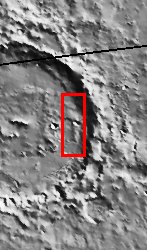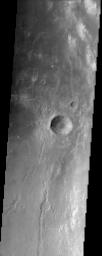Eastern Floor of Holden Crater
Caption:

(Released 15 April 2002)
The Science
Today's THEMIS image covers territory on the eastern floor of Holden Crater, which is located in region of the southern hemisphere called Noachis Terra. Holden Crater is 154 km in diameter and named after American Astronomer Edward Holden (1846-1914). This image shows a mottled surface with channels, hills, ridges and impact craters. The largest crater seen in this image is 5 km in diameter. This crater has gullies and what appears to be horizontal layers in its walls.
The Story
With its beautiful symmetry and gullies radially streaming down to the floor, the dominant crater in this image is an impressive focal point. Yet, it is really just a small crater within a much larger one named Holden Crater. Take a look at the context image to the right to see just how much bigger Holden Crater is. Then come back to the image strip that shows the mottled surface of Holden Crater's eastern floor in greater detail, and count how many hills, ridges, channels, and small impact craters can be seen. No perfectly smooth terrain abounds there, that's for sure.
The textured terrain of Holden Crater has been particularly intriguing ever since the Mars Orbital Camera on the Mars Global Surveyor spacecraft found evidence of sedimentary rock layers there that might have formed in lakes or shallow seas in Mars' ancient past. This finding suggests that Mars may have been more like Earth long ago, with water on its surface. Holden Crater might even have held a lake long ago. No one knows for sure, but it's an exciting possibility. Why?
If water was once on the surface of Mars long enough to form sedimentary materials, maybe it was there long enough for microbial life to have developed too. (Life as we know it just isn't possible without the long-term presence of liquid water.) The question of life on the red planet is certainly tantalizing, but scientists will need to engage in a huge amount of further investigation to begin to know the answer. That's why orbital images of Holden Crater like this one are so important. They continue to help scientists piece together the answers to their fundamental questions about the planet's environment and its potential as a past or present habitat for life.
Cataloging Keywords:
| Name |
Value |
Additional Values |
| Target |
Mars |
|
| System |
|
|
| Target Type |
Planet |
|
| Mission |
2001 Mars Odyssey |
Mars Global Surveyor (MGS) |
| Instrument Host |
Mars Odyssey |
Mars Global Surveyor |
| Host Type |
Orbiter |
|
| Instrument |
Thermal Emission Imaging System (THEMIS) |
|
| Detector |
|
|
| Extra Keywords |
Crater, Grayscale, Impact, Water |
| Acquisition Date |
|
| Release Date |
2002-05-21 |
| Date in Caption |
2002-04-15 |
|
| Image Credit |
NASA/JPL/Arizona State University |
| Source |
photojournal.jpl.nasa.gov/catalog/PIA03769 |
| Identifier |
PIA03769 |


